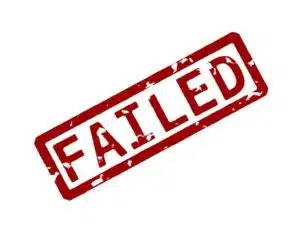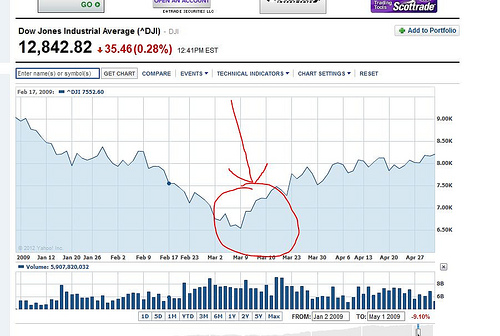If there’s one thing that you maybe haven’t noticed about most financial advisors, it’s that we are arrogant pricks.

Please note that I said “we are” – not “they are” – as I include myself in that statement.
We all have firms that provide the most superior customer service. We all have investment strategies that either outpace the market or have the lowest internal expense.
Face it, as financial advisors, we have this attitude that we can’t do wrong and if we DO something wrong, it’s easy to cast the blame and point our finger at the stock market.
I’m here to tell you that I’m not perfect.
While I wish I could sit here and tell you I provide all of my clients with exceptional customer service and that my investment strategies mirror Wall Street’s investment gurus – the truth is I’m far from it.
There have been many times I have failed as a financial advisor, but there is one instance that still haunts me to this day.
An Unexpected Referral
It was 2007 and my dad, who typically wasn’t one for finding me new clients, stumbled across a gentleman who was just laid off. He was a factory worker and when his employer’s plant closed down, he now had access to a pension and a small 401(k) that he could roll over. He was still five years away from reaching retirement at his determined retirement age, so he wanted to invest the money and let it grow.
He didn’t have much experience with the market other than his 401(k) that he had been in for about seven years. After walking him through various investment strategies, we decided upon a portfolio of roughly 55% stocks and 45% bonds, mostly invested in mutual funds. For the first year and a half, things worked out great. In his mind, he was making a little bit of money and from my side, I had a client that was content with the gains he saw.
October Hits
Everything seemed fine until October of 2008. For those of you who had money invested in the market at that time- I’m sure I don’t need to rehash old wounds and remind you of how bad that time was. For my client, it was worse than any flashbacks from Vietnam! He didn’t know what hit him and frankly, like most other financial advisors, I was a bit shell-shocked myself.
I like to say that thankfully, we are only 55% in the stock market and we “only lost” a certain percentage, and yes, it could have been worse – but try telling that to someone who had never been through such a steep market decline. Even though everyone else was going through the same situation, there was little comfort for my client that he wasn’t alone in losing a large percentage of his investments.
He confided in me and trusted me and asked me for my advice. Like I did for many other clients, I echoed the advice:
“We’ve got to stick it out.”
I explained that he couldn’t sell now, because if he did, he’ll never get the money back, especially if he took the proceeds and transferred it to the bank and put it into a CD.
I can’t remember the exact percentage, but I am fairly certain we were down about 25% from the high and about 20% down from his initial investment. At the time, banks were paying between 2% and 3%, so it would take him many years to get his money back.
Depending on my advice, he stayed put. Into the new year, we saw some improvement and many of us hoped that the market was on its road to recovery – but like any big wave, the down current was just getting ready to suck us all back in.
Bad Market, Round 2
Enter March of 2009. I’ll never forget the day. The Dow was down again having dropped over 1,700 points since the beginning of February. It finally hit the bottom on March 9th, 2009 but obviously, no one knew that.
What I do remember about that day because my client called me and he had enough.
He was ready to cash out completely. I tried one last attempt to encourage him to stay put, but he wasn’t having it. As I did with all of my clients, I said,
“I feel like I’m letting you down by letting you cash out, but at the end of the day, it’s your money and you’re in charge and I’ll do what you want me to do”.
He didn’t take much time to think about it and he gave me the instructions to liquidate. I can’t tell you what it feels like knowing that in your heart a person is doing the wrong thing, and no matter what you say or any information or research that you provide to support your reasoning, they’re still going to act upon that wrong decision.
That day, I felt like a failure.
That day, I was a failure.
With hindsight and 20/20, we all know now the market has recovered and had the client left the money right where it was, he would have been made whole and then some by now.
What adds insult to injury is the very next day, literally the day after he cashed out, the market was up big. And over the next seven days, he would have recouped just under 11% of what he lost.
And yes, I know that 11% would not have recovered all of his losses, it would still have put several thousand dollars back into his pocket.
I hate losing my client’s money.
I could take my retirement, cash it out, bet it on black on a roulette table, and lose it all at a casino and it wouldn’t stress me out as much as watching someone do what this guy did.
This isn’t a news flash for most of you, financial advisors are not perfect, but let me maybe be one of the first to admit it, I’m definitely far from it.









Here’s the perspective of a non-advisor engineer. I think it really depends on several factors as to the right decision. For those whose retirement horizon was less than 5 years at that time, I can understand the “protection” mentality. Knowing that time was against them, it would make sense to cut ones losses.
Factor in also that the industry, at that time, was full of unproven advisors with little more than an MBA and a couple years of practical experience, it is also understandable that those nearing retirement could see their advisor as an unproven commodity and frankly, for many they were right. There was definitely a sense if hubris during the bubble years, with many 20 somethings earning 6 figure salaries and having never experienced a severe correction.
Did you personally fail your client? Not really. The mix was far more prudent than many would have provided. However, neither was your client totally remiss in liquidating. I myself threw everything into stable funds in January 2008, because I could see the carelessness with which fund managers were moving vast sums around without fully understanding the risks.. (I was working for a retail bank at the time, and everyone who worked on the retail banking side could see the coming storm.).
I think it was the hubris of inexperienced advisors coupled with the unrealistic expectations of constant quarterly gains, and the growing debt to income ratios created by the housing bubble that created an uneasiness. The run on the markets was a psychological one that once set into motion escalated exponentially . It stands to reason that your client was probably among those that began to see the cracks in the armor, and acted according to a general fear and distrust of the masses of untested financial “professionals”.
That said, people aren’t stupid and they realize that no promise an advisor makes can be seen as a guarantee. I don’t think you’re client made such a devastating mistake at all. I think it was a decision made by a man who had listed upside potential given his age and portfolio while simultaneously seeing massive downside probability, high risk, and a low risk tolerance. I think he made a rational and reasonable decision given the information available.
You should not feel like a failure. You helped that man to the best of your abilities, he just couldn’t see what you saw. Pat yourself on the back for being an honest advisor who wants the best for their client 🙂
That was a painful, painful period of time. Nobody knows the future, and keeping the PA in equities at only 55% is a WIN in my book!
Yes, it would have been great to go 100% equities at that point, but again, we never know. 20% higher than the bottom seemed like a good entry point too!
Sam
Handling someone else’s money is a whole lot of pressure. YOU didn’t fail as an advisor… the markets failed you! I don’t think anyone managed to make significant gains during those months… I sure know we didn’t.
You did not fail. I think you tried your best. If your client had invested in his financial education, he would have developed an entry and exit strategy rather than ride the market to the bottom and exit at the worst possible time.
There’s not really much you could have done differently, once he had his mind made up to get out, that was the end for him. It was always going to be an uphill battle convincing him to stay after those kinds of losses.
On a side note, want to sign up for a Banana Republic credit card, and get 20% off your entire purchase?? 🙂
That case sounds like it still haunts you. Do you know what happened to the man? It is unfortunate that his first, and perhaps only, experience with the market was during such a turbulent time.
We only talked a few times after that day; the last being when he needed some tax information for his accountant. Haven’t heard from him since.
Great story. I was just thinking yesterday about writing my own “haunting” story as an advisor. It’s eerily similar to yours.
Here is what I think about when I read your story, though: you did your part. You still captained the ship, which is what you were paid to do. He’s the one who decided to jump overboard, not you. I know it still stings, but in the end analysis, if he wasn’t going to spend the money that day, you were right now with your advice.
Thanks for feedback. As you know, as an advisor it’s heard not to wear the burden on your shoulders.